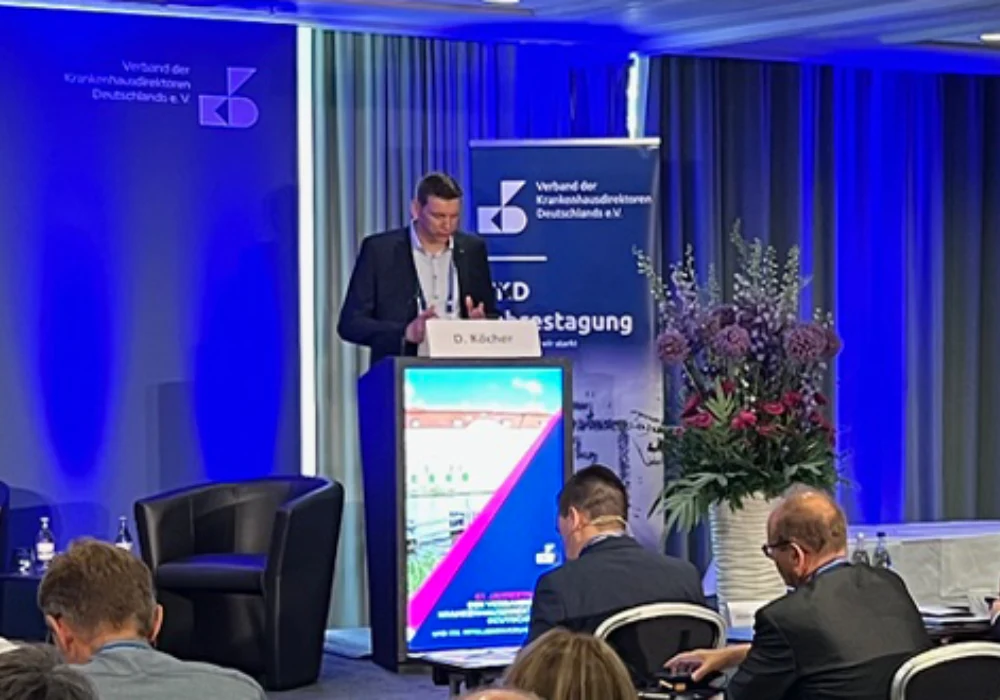Euphoria wasn't necessarily the emotional state in which the approximately 140 participants gathered today at the annual conference of the Association of Hospital Directors of Germany. Rather, it is a kind of skeptical courage for the future that characterises the 67th annual conference of the VKD, which is taking place today and tomorrow in Berlin-Köpenick.
Hospitals, management, and staff are currently struggling through an economic crisis the likes of which the industry has never experienced before. At the same time, the direction of hospital care seems to have been determined by the hospital reform passed last year. Is it possible to emerge from this crisis and reposition ourselves for the future? "Crisis as Opportunity – The Transformation of Hospitals" is the motto of the conference. Participants will discuss how this could be achieved with politicians, experts, and, of course, with each other.
VKD President Dirk Köcher, who opened the conference, briefly described the situation of hospitals in Germany with regard to the implementation of the Hospital Reform Act (KHVVG). "Since its entry into force in December 2024, hospital reform has become more and more a reality with each passing day, and it is becoming clear what happens when a law of such enormous substantive importance is pushed through by the legislature without genuine involvement of practitioners. A key factor for all of us is the uncertainty about how this path of change will be shaped in concrete terms. Timelines that are already unattainable, a lack of legal basis, and the resulting ambiguities in implementation often prevent us from strategically adapting our services to new needs," he explained. "We therefore expect short-term adjustments from the new federal government and our new Federal Minister of Health before the damage becomes even greater," he demanded.
For hospitals, the adjustment of various hospital reform regulations envisaged in the coalition agreement, as well as the financial compensation for the cost-revenue gap for 2022 and 2023, are of utmost importance. The VKD President and conference participants therefore viewed the announcement of emergency aid amounting to four billion euros by Federal Health Minister Nina Warken at the Health Ministers' Conference on June 11 and 12, 2025, in Weimar as a first ray of hope.
These are apparently to be paid out pro rata in a first tranche in 2025, with a second tranche then in 2026. "This would be important, but only short-term, support for the hospitals, because with the further implementation of the KHVVG and, above all, the still valid reserve financing, the financing would be reset to the currently too low basic level from 2027 onwards," commented Dirk Köcher.
Involvement of practitioners necessary for meaningful solutions
"There are certainly opportunities in this situation, but for that, we need a secure framework, i.e., planning security," emphasised the VKD President. "We haven't had that for several years. First, the coronavirus had us under control for several years, and then a Federal Minister of Health who deliberately exacerbated the economically difficult situation of hospitals in order to enforce his laws with little involvement of practitioners. The consequences of this misguided policy, which affects both large hospitals and many small hospitals in rural areas, are leading to an unplanned thinning of care. We as the VKD and all our members in their various roles throughout Germany, however, are ready, especially now in this difficult situation, to work together with politicians and local governments to advance sensible and implementable solutions."
Adjustments are often still necessary
How can the current crisis be used as an opportunity to reposition hospitals, as an entire industry? Following the well-known motto "Never waste a good crisis", can a difficult situation also be used as a catalyst for positive changes that would otherwise not be tackled? In other words, as an opportunity? VKD press spokesman Andreas Tyzak, who moderated the conference and the panel discussion on the first day, started the discussion with representatives from politics and associations. Here, Dirk Köcher pointed out that important legal regulations and the recently announced new law were still missing. At the same time, the discussion highlighted the difficulty of striking a balance between the structural reforms that have been initiated, on the one hand, and the growing pressure in relation to possible war events in Europe to increase the performance of hospitals and to consolidate them even in times of emergency. A difficult topic discussed in the round was the hybrid DRGs, which are to be massively expanded – to one million cases next year, to 1.5 million in 2028, and then to two million cases starting in 2030. This would mean significant revenue reductions, which would be exacerbated if the reimbursements for these services were also to be reduced to outpatient levels by 2030.
"While the KHVVG is intended to bring financial improvements, the hybrid DRG requirements are negated – and to a considerable extent," said the VKD president. There is no voluntary approach here, and expanding it to include more day cases, for example, would introduce hybrid DRGs that have no counterpart in the outpatient sector and therefore no basis for calculation."
Even in the discussions later during the break, the prevailing opinion of the participants was that, from the VKD's point of view, the benchmark for hospital remuneration should not be a one-sided view of the significantly less complex quality and structural requirements of the contracted physicians.
"With two million cases, we're talking about approximately 12 percent of all inpatient cases. If, in addition to the already existing revenue gap, there is a further drastic devaluation of reimbursement, this will only lead to an even greater loss of care across the country. Here, we only hope that the first initiatives to change the regulations regarding hybrid DRGs will bring relevant adjustments," explained the VKD President.
This controversial topic will be explored in more depth on the second day of the conference, focusing on practical experiences with hybrid DRGs. The topic of outpatient care will also include new strategies.
108th General Meeting
Following the first day of the conference, the 108th VKD General Assembly will take place. Peter Asché, Dr. Josef Düllings, Angela Krug, Dr. Falko Milski, and Dr. Günter Merschbächer will be named honorary members (in alphabetical order) as deserving members of the association, upon nomination by their regional groups.
Original Press Release: This is a translated version of the original German press release. To view the original text, Click Here (German).
Image Credit: VKD










